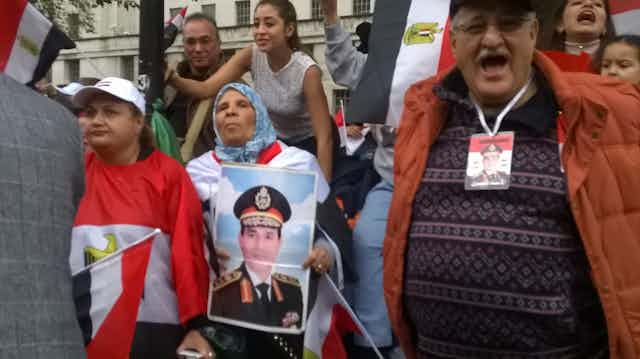You couldn’t say there was a warm welcome for Egypt’s president Abdel Fattah al-Sisi when he visited London to meet prime minister David Cameron. Hundreds turned out, despite miserable weather – some to hail their hero, but many others to denounce a despot and a “butcher”. Police kept the peace – just – but when I went to talk to these demonstrators what I found was evidence of a bitterly unhappy and deeply divided nation.
The visit has drawn criticism from campaigners and some politicians – Labour leader, Jeremy Corbyn, said Cameron’s decision to host Sisi showed “contempt for human and democratic rights”. This opinion was vociferously debated by the crowd which was split between those opposed to what they see as Sisi’s manipulative, repressive and anti-democratic regime and those who came to sing the Egyptian president’s praises.
This febrile atmosphere was only heightened by the security situation in Sinai after the downing of a Russian airliner days before, which had taken off from the Egyptian resort of Sharm el Sheikh and which many, Cameron included, suspect may have had a bomb on board.
One man’s saviour
Sisi came to power in 2013 after ousting the democratically elected president, Muhammad Morsi in what many have called a “military coup” in which hundreds of Muslim Brotherhood supporters of the deposed president were killed and many thousands more arrested. Egypt’s jails are now filled with dissenters, many of whom have been sentenced to death, including Morsi himself. Sisi’s crackdown has also involved the detention of journalists and academics amounting to a direct attack on free speech.
While downplaying the repressive nature of his regime, Sisi has relied on the “politics of magnificence” – the inauguration of a new branch of the Suez Canal, for example to project an image of himself as the natural successor to Gamal Abdel Nasser. This is a comparison which he hopes will highlight both his focus on “national unity” and his desire to provide a politic of spectacle, which is dressed up as a solution for Egypt’s economic malaise.

Certainly the pride of the spectacle provided by Sisi was on the mind of one woman I spoke to who was effusive in her support for the Egyptian president:
You see what al-Sisi has done with the Suez Canal? In one year! … He will do better than Gamal Abdel Nasser, just give him time. He works 24 hours a day.
For another man, also there to support the Egyptian president, economic growth would inevitably lead to political stability:
Al-Sisi is offering housing to lower-income people … If we manage to eradicate poverty and provide jobs, the country will be stable.

Theories show us,instead, that the connection between growth and stability/security is not straightforward.
For these people the presence of anti-Sisi protesters was evidence of the insidious influence of the Muslim Brotherhood, who – said some – were offering people money to turn up and oppose their president.
You see those persons (the Muslim Brotherhood faction) they are not Muslims. They are terrorists. (..) A friend of mine told me – she swore to me – that the Muslim Brotherhood offered a friend of her from 250 to 300 pounds to join the protest.

Is another’s butcher …
Across the other side of a police cordon from the banners declaring: “We love you Sisi!” were some Muslim Brotherhood supporters who held banners denouncing Sisi as a “dictator” and “butcher”. Since 2013 Amnesty International and Human Rights Watch have highlighted abuses committed by Sisi’s security forces, particularly against Muslim Brotherhood members and opponents who languish in jail in their thousands in violation of article 60 of the 2014 constitution.
But it is Sisi’s rhetoric about security which has won him the support of a significant portion of the Egyptian people as well as a receptive ear in Downing Street. Sisi’s visit to the UK has been promoted in this way – and, of course, the downing of the Russian airliner flying out of the resort town of Sharm el Sheikh lent weight to that narrative.
British sales to Egypt of tear gas and other weapons of repression are not trumpeted – security and Egypt’s part in the fight against jihadism remain the ostensible reasons for the UK’s support for Sisi’s regime.

But Maha Azzam from the Egyptian Revolutionary Council, who was in Downing Street to protest the visit, sees things differently. For her, Sisi’s visit is all about the president’s attempt to present himself and his regime to Western states as democratic and inclusive – something which flies in the face of the executive’s absolute refusal to deal with Freedom and Justice party which gained the majority of seats in the parliamentary elections of 2014.

The campaign for the upcoming parliamentary elections provides little reason to hope for change. At the moment there is neither a religious or secular opposition in Egypt and restrictions imposed on protest and fiercely enforced by the military are making protest – peaceful or otherwise – virtually impossible.
Revolutionary road
Standing apart from both from the pro-Sisi and the Muslim Brotherhood protesters, the revolutionaries demanded an end to both religious and military fascism, calling for a continuation of the January 25 2011 revolution and the implementation of social justice and dignity. They see this position as representative of the majority of Egyptians who today keep a very low profile, fearing jail and even torture.

This enduring fear was summed up by one woman stood with the revolutionaries who denounced both Muslim Brotherhood and al-Sisi’s supporters as “liars” before insisting that the will of the people for reform could not be killed off, even in the face of repression.
We are there [in Cairo] but we cannot talk. I tell you one thing, the revolution will continue, I can tell you that. But not now.

